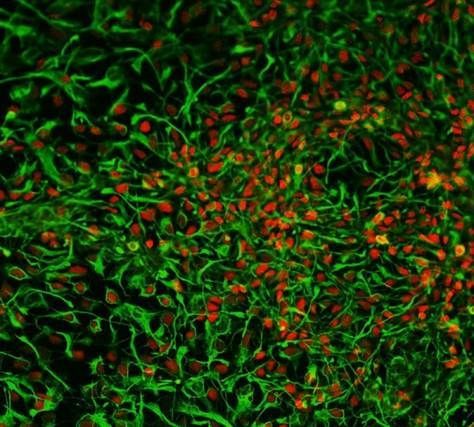中国科学家利用尿液成功制造脑细胞
 科学家已经成功创造出利用尿液制造人体脑细胞的方法
科学家已经成功创造出利用尿液制造人体脑细胞的方法Chinese scientists have found a new, innovative way to use cells found in human urine that could aid in the treatment of a range of neurodegenerative disorders。
The scientists have discovered a new technique for reprogramming cells shed in human urine into neural progenitor cells (NPCs) that can grow into multi-functional neuronal subtypes and glial cells。
The technique is expected to be used in the study and treatment of neural disorders such as Parkinson's disease, Alzheimer's disease and other neurodegenerative disorders。
Their findings were published online on Dec. 9 in a research report in the journal Nature Methods, a monthly publication covering novel findings in life sciences。
Pei Duanqing, a professor at the Chinese Academy of Sciences' Guangzhou Institutes of Biomedicine and Health, said his research team has combined an episomal system to deliver reprogramming factors with a chemically defined culture medium to reprogram kidney epithelial cells naturally shed in urine into NPCs。
These NPCs, normally only found in the human brain, were later proven to be transgene-free and self-renewing, he said。
"These neurons and glial cells can survive for up to one month when transplanted into the brain of a newborn rat," said Pei。
He said his team is working hard to understand why their experimental condition allowed the urine cells to become NPCs so as to improve the technique and make it more efficient。
Scientists have long sought to treat and study neural disorders by obtaining and transplanting neural stem cells. However, the previous method of isolating and using cells from either fetal or adult human tissue remain challenging due to ethical concerns and immune system rejections, he said。
Pei hopes the discovery will be used to generate NPCs from patients with neurological disorders such as Parkinson's disease. "These NPCs from patients may help us discover new drugs for these diseases."
"It is a remarkable advance in the stem cell field," said Fred Gage, professor with the Salk Institute for Biological Studies。
They reprogrammed somatic cells with a non-integrating virus and epithelial-like cells from human urine, a novel, safe and abundant source of cells, he said。
The results and methods derived from this study will be of great value and significance to the field, he said。
据美国科学生活网LiveScience报道,中国科学家近日发明了一种全新制造脑细胞的方法,这种方法比之前抽取人体血液制造脑细胞的方式更为简单安全。最令人称奇的是,这种新方法居然是通过收集人体自然排泄尿液中的肾脏内表皮细胞来制造新的脑细胞。
从尿液中制造干细胞
科学家利用尿液提取表皮细胞来重新制成了干细胞,这种细胞可以变成人体内任何一种细胞,包括脑细胞。在此项研究中,科学家已经成功将这些细胞转变成了神经细胞和脑细胞。科学家们的最新研究成果已经在本周日刊登于《自然方法》期刊上。
或许在未来该技术被广泛应用之时,医生可以快速获取对于患者来说至关重要的脑细胞。而且因为该项技术依赖于人体尿液,这种技术会比原来通过抽取患者血液制造脑细胞的方式更为简单方便,也更加安全。因为通过这样的方式医生不用从病人体内再提取任何其他的东西,只需要收集自然排出的尿液就行。美国康涅狄格大学医疗中心研究员马克-拉朗德告诉记者,“对于一个儿童患者来说,获取他们的尿液要比从他们体内抽取血液要简单多了。”
多年来,科学家们一直在努力尝试着不同的方法让人体的其他种类细胞转变为干细胞。研究者曾经试验过通过睾丸干细胞制造胰岛素将尸体的脑细胞变成了干细胞,这种方法也被用来治疗帕金森综合症和老年痴呆症。
未参与此次研究的美国西奈山医学院干细胞研究员克里斯坦-布伦南表示,原先的许多方法都会利用病毒将新的基因信息传递到细胞的DNA中。因为病毒脱氧核糖核酸会永久地停留在细胞的基因密码中,这可能会导致这些细胞发生一些不可预知的行为,甚至让细胞变异为肿瘤。
在最近的研究成果中,中国的研究团队使用了一种更加安全的方式。研究人员通过采集通过尿液排出的肾脏内壁表皮细胞,并向其中注入新的基因指令来将其变为脑细胞。有了这些新的基因指令,采集到的细胞会变为脑干细胞,这种脑干细胞也可以根据需要变为各种其他的脑细胞。从肾脏细胞变为脑干细胞的整个过程仅仅需要约12天左右。不到半个月的时间,新的脑细胞就会完全产生。
在针对小白鼠的测试结果表示,这种利用尿液制造脑细胞的方式不会让细胞出现肿瘤。由于这种方式几乎适用于任何患者,因此该项研究成果目前可以被认为是该领域最先进的方法。
- 科学双语:食用冰淇淋过快导致脑结冰头痛(图)2012-04-28 15:58
- 双语靠谱科学:“奶嘴男”的心理最健康(图)2012-03-26 09:49
- 双语靠谱科学:爱走神的孩子更聪明(图)2012-03-20 09:45
- 双语靠谱科学研究:想美白吃蔬菜(图)2012-03-09 10:37
- 双语:科学家发现剖腹产宝宝易超重(图)2011-11-24 10:56


